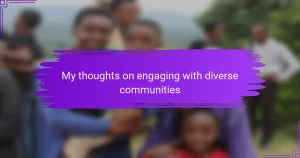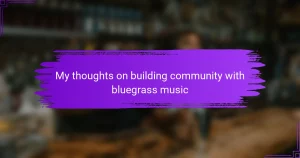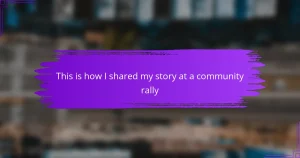Key takeaways
- The Obama supporter community fostered a unique bond through a shared belief in hope and change, emphasizing inclusivity and diverse voices.
- Organizing for Action (OFA) empowered ordinary citizens to engage in meaningful political actions and maintain momentum beyond short-term activism.
- Key challenges included overcoming skepticism and navigating diverse perspectives, which ultimately strengthened the group’s unity and resilience.
- Important lessons learned involved the power of patience, listening, and flexibility, highlighting the significance of teamwork in achieving shared goals.
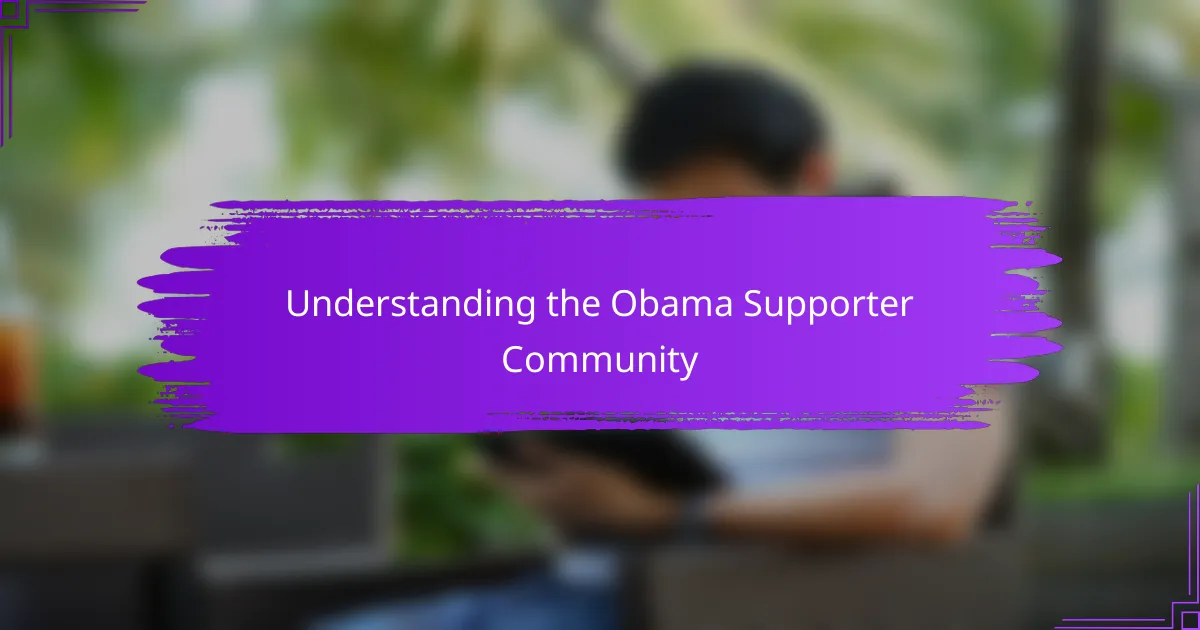
Understanding the Obama Supporter Community
The Obama supporter community, from my experience, feels like more than just a political group—it’s a shared belief in hope and change. Have you ever been part of a movement where everyone seems aligned not just by politics, but by a deeper sense of purpose? That’s exactly the energy I encountered.
What stood out to me was the genuine enthusiasm and optimism despite challenges. It wasn’t just about supporting a candidate; it was about believing in a vision that felt personal and attainable. That kind of connection creates a unique bond, one that I still carry with me whenever I reflect on those times.
I also noticed how diverse voices within the community came together, showing that supporting Obama wasn’t tied to a single identity or background. It made me wonder—how often do political communities feel this inclusive and energized? This inclusivity was a defining part of what made the experience so meaningful for me.
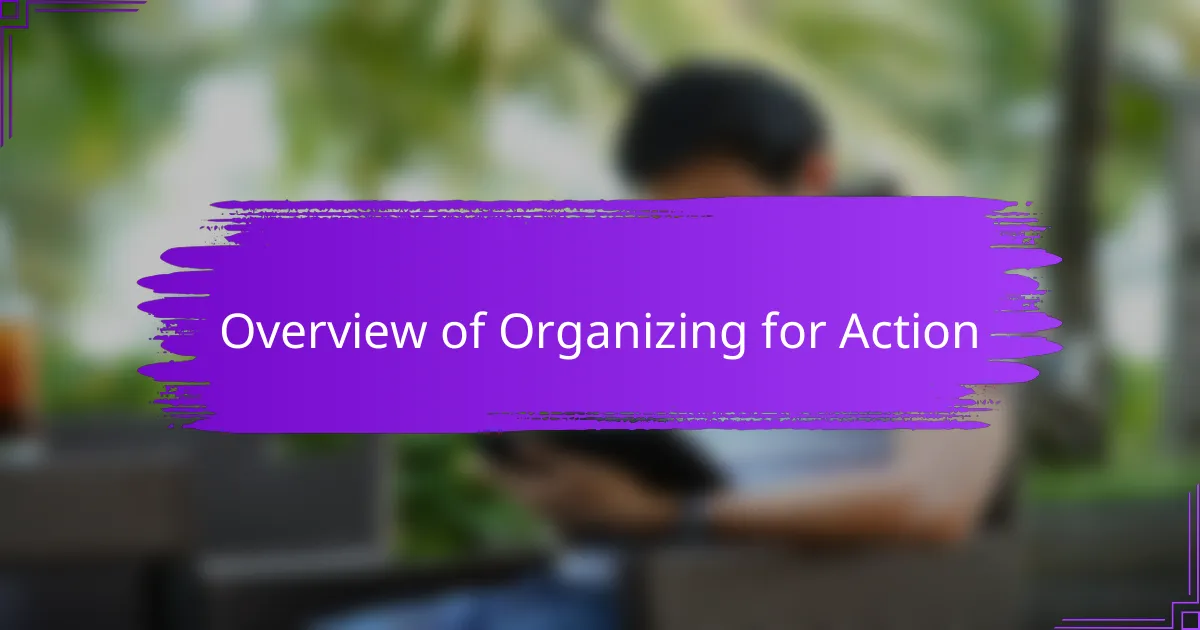
Overview of Organizing for Action
Organizing for Action (OFA), as I came to know it, is more than just a grassroots advocacy group; it’s a continuation of the momentum built during Obama’s presidency. Have you ever joined a cause where the work feels both urgent and hopeful at the same time? That balance is what OFA embodied for me.
What really impressed me was how OFA mobilized everyday people—including myself—to engage in meaningful political conversations and actions. It wasn’t about distant politicians but about empowering ordinary citizens to influence policy and community change. I found that sense of empowerment surprisingly motivating.
OFA’s approach felt refreshingly inclusive and action-oriented, which made me want to stay involved even when the news cycle grew discouraging. Have you noticed how staying connected to a purpose-driven group can sustain your energy during tough times? For me, OFA was exactly that kind of sustaining force.
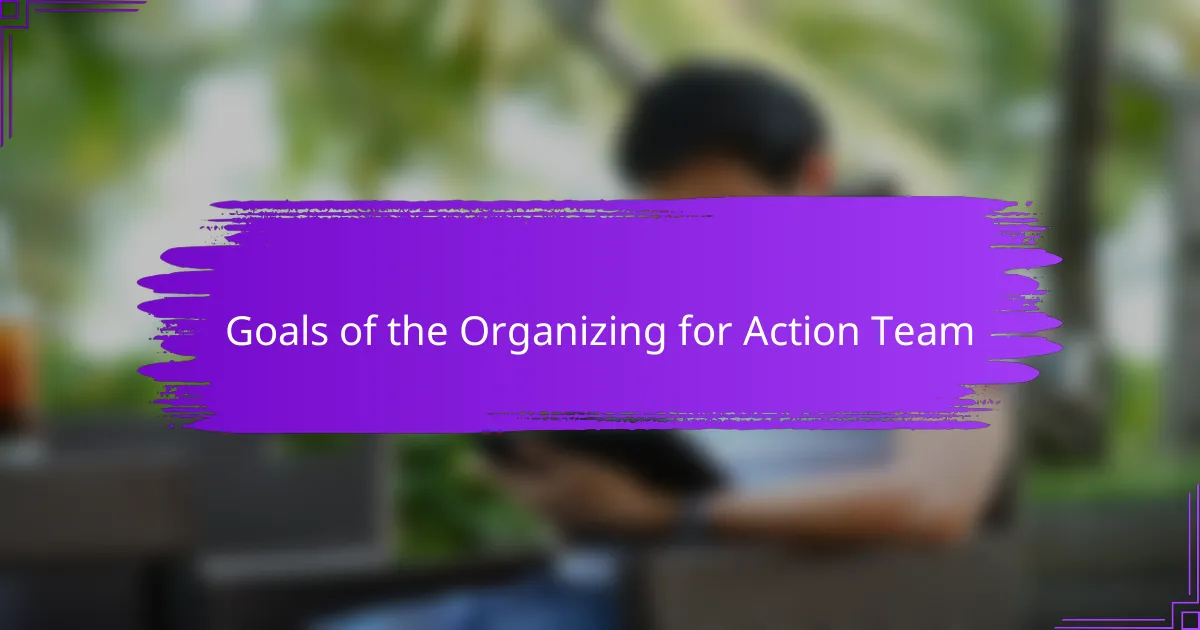
Goals of the Organizing for Action Team
What really struck me about the goals of the Organizing for Action team was their clear focus on turning hope into tangible change. They aimed to rally people to advocate for policies that mattered, from healthcare to climate action, making the political process feel less distant and more within our grasp. Have you ever felt that fire to do more than just vote? That’s exactly the spark OFA wanted to ignite.
Another goal that stood out was their commitment to building a sustained movement rather than a fleeting moment of activism. They weren’t just looking for short bursts of energy but wanted to create ongoing conversations and actions that could reshape communities over time. In my own experience, this long-term vision made me feel like I was part of something bigger than any single campaign.
Lastly, OFA emphasized inclusivity and empowerment, encouraging individuals like me to find our unique voice and role in the political landscape. It wasn’t about fitting a mold but about bringing diverse perspectives together to drive change. Isn’t it refreshing when a group genuinely values your input and energy? That personal touch kept me engaged and hopeful throughout my time with the team.
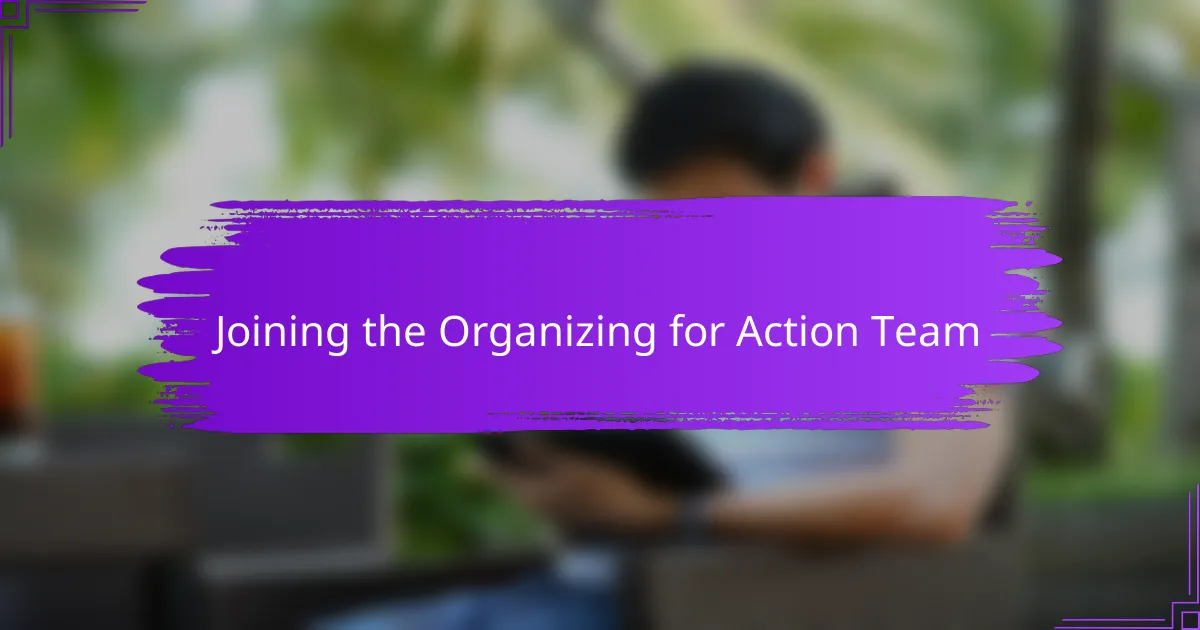
Joining the Organizing for Action Team
Joining the Organizing for Action team felt like stepping into a space where my passion for change met real opportunity. I remember feeling a mix of excitement and a bit of nervousness, wondering if I could actually make a difference alongside so many committed people. Have you ever jumped into something new and immediately sensed that it was exactly where you needed to be?
From the very first meeting, I noticed how welcoming and organized the team was. It wasn’t just about signing up; it was about feeling heard and knowing that my efforts, no matter how small, would contribute to a larger cause. That sense of being part of a purposeful community motivated me to keep showing up, even when life got busy.
What struck me most was the blend of grassroots energy and strategic thinking. I often asked myself, how can a volunteer group maintain that balance between passion and effectiveness? OFA seemed to have cracked that code, and being part of it gave me a real sense of agency in shaping the conversations that mattered.
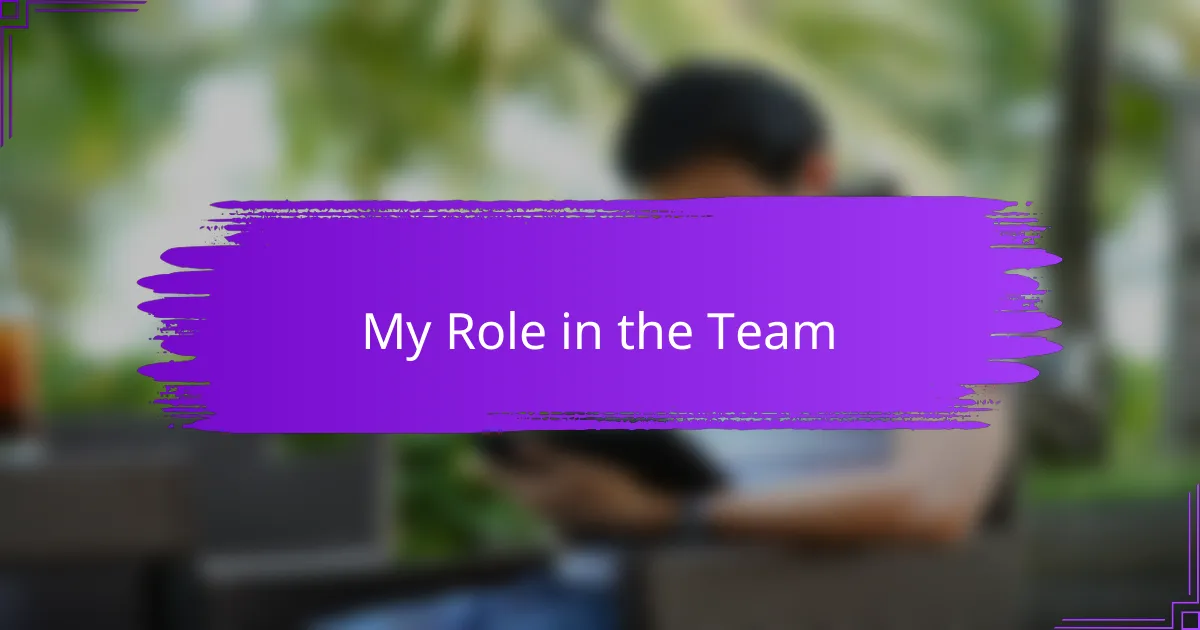
My Role in the Team
When I first took on my role in the Organizing for Action team, I was eager but unsure exactly how I could contribute. Did I have the skills or the voice needed to make an impact? Quickly, I realized that every effort counted—from calling neighbors to organizing small meetups—and my role was to be a connector, bringing people together around shared values.
I found myself naturally stepping into the role of a communicator, whether it was through writing emails or leading conversations at local events. It was rewarding to see hesitant supporters become energized participants after a simple chat. Have you ever experienced the power of words turning uncertainty into action? That was a constant highlight for me.
My role also meant being adaptable, shifting between tasks as needs arose. One day I’d be coordinating volunteers, the next advocating specific policies, but always with the same goal: to keep the momentum alive and inclusive. Knowing I played a part in sustaining that energy gave me a sense of purpose that went beyond politics—it felt truly personal.

Key Challenges Faced
Challenges surfaced almost immediately, especially when trying to mobilize people who were enthusiastic but also overwhelmed by the sheer scope of issues. Have you ever felt like your passion was met with skepticism or burnout? I encountered that tension often, balancing hope with the reality of limited time and energy.
Another hurdle was navigating the diversity within the team itself—different perspectives, priorities, and levels of experience sometimes made unity feel fragile. It made me wonder how a group can stay cohesive when everyone brings such varied hopes to the table. Yet, those very differences also pushed us to listen more deeply and grow collectively.
At times, the external political climate felt daunting, with setbacks threatening our motivation. I questioned whether our small actions could truly move the needle in a landscape so vast and complex. Still, the shared commitment within the team kept me going, reminding me that change is rarely instant but always worth pursuing.
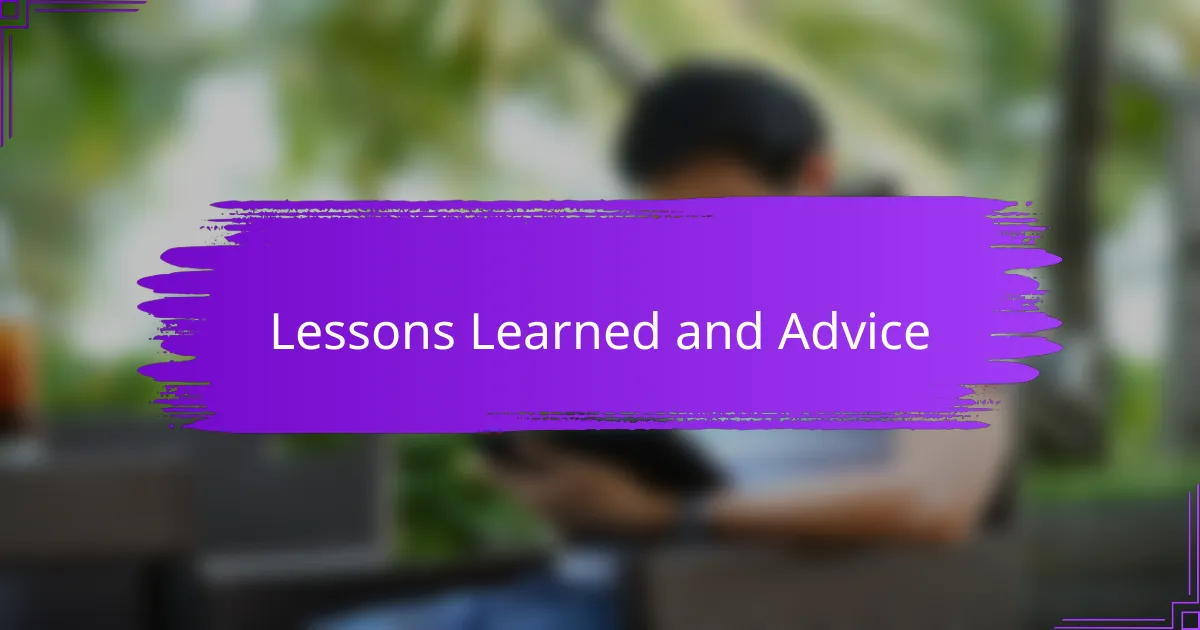
Lessons Learned and Advice
One lesson I learned early on was the importance of patience and persistence. Change doesn’t come overnight, and I often had to remind myself that every phone call or conversation was a small step forward. Have you ever felt discouraged when progress seemed slow? I found that leaning into that discomfort taught me resilience.
Another insight was the power of listening. I realized that truly hearing people’s concerns—without rushing to fix or argue—opened more doors than expected. It was in those moments of genuine connection that I saw barriers break down and energy spark. Have you noticed how a patient ear can transform a skeptic into an ally? That’s a skill I now value deeply.
If I could give advice, it would be to embrace flexibility and teamwork. No single approach works all the time, and being open to new ideas kept our team adaptable and effective. Plus, celebrating small victories together made the journey feel rewarding, even when the challenges loomed large. Isn’t it amazing how teamwork can turn daunting goals into shared success?
